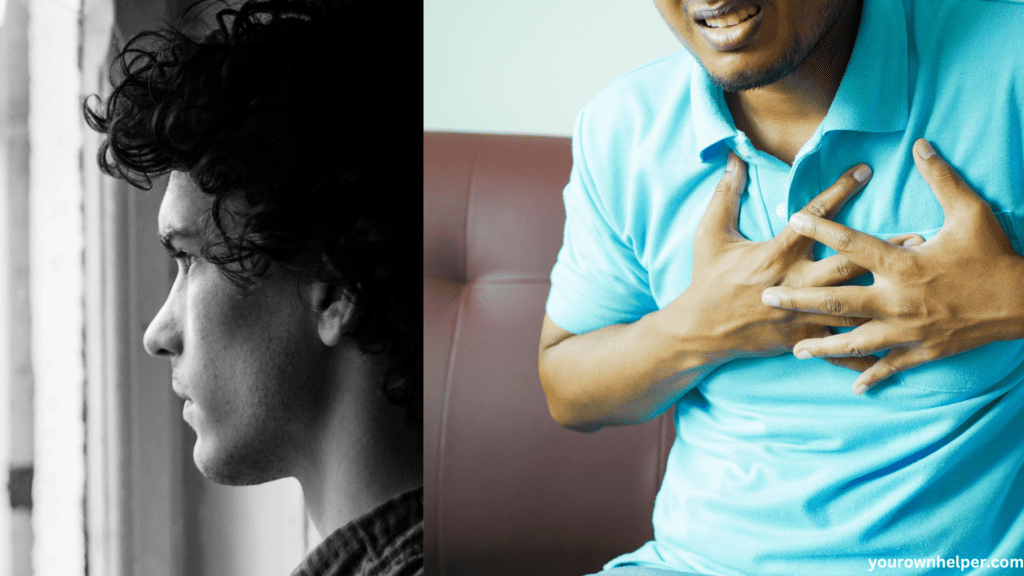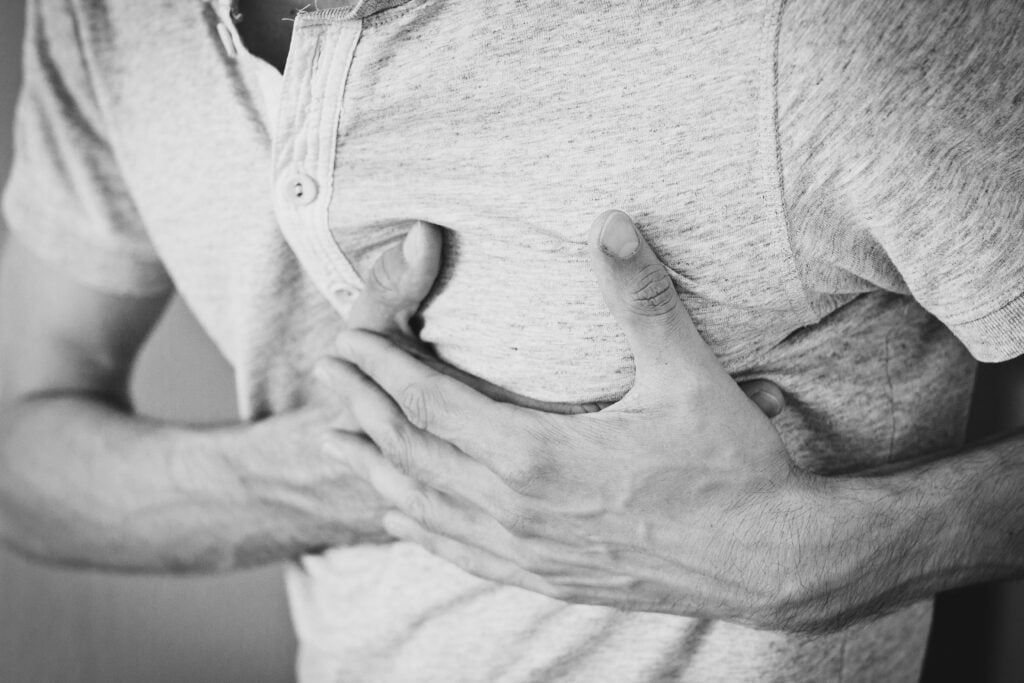
You feel a tightening in your chest. Your heart starts to race. You take deep breaths, but nothing seemed to help. Sounds familiar? Many people suffer from anxiety-related chest discomfort and tightness. In this post, we will look at the relationship between anxiety and chest discomfort, including symptoms, causes, treatments, and ways to get relief. We’ll also talk about the differences between anxiety and stress, so you can figure out what’s going on. Whether you suffer from anxiety disorders or simply worry on occasion, you will learn how to deal with anxiety-related chest discomfort. With the proper information and coping strategies, you can end the cycle of anxiety and chest pain. Continue reading to learn more about the relationship and how you might feel better soon.
Can Anxiety Cause Chest Pain?
Anxiety can trigger chest pain. When you’re anxious, your body experiences physical changes, like Increased heart rate, that can lead to chest pain or discomfort.
Rapid Heartbeat
Anxiety activates your body’s fight-or-flight response, which speeds up your heart rate. A rapid, pounding heartbeat is a common anxiety symptom and can cause chest pain, especially if you have a panic attack. Taking deep breaths and relaxation techniques can help slow your heart rate and ease the pain.
Muscle Tension
Anxiety creates muscle tension, particularly in the chest area. Tight chest muscles can cause pain and discomfort. Progressive muscular relaxation, massage therapy, and gentle yoga stretches can all help ease stress and anxiety-related chest pain.
Hyperventilation
Anxiety can cause hyperventilation and quick, shallow breathing. This might cause chest pain, disorientation, and numbness in the hands and feet. To relieve hyperventilation and associated chest pain, take slower, deeper breaths from your diaphragm.
Indigestion
Anxiety can also cause indigestion symptoms such as gas, bloating, and stomach pain, resulting in chest discomfort. Reducing anxiety, eating smaller meals, and avoiding trigger foods may help to alleviate indigestion and chest pain.
If your chest pain is severe or lasts more than a few minutes, seek medical attention right once, since it may suggest a heart attack or another medical emergency. However, in many cases, anxiety is the root cause of transient chest discomfort. Managing your anxiety through self-help tactics and professional treatment can help you avoid and relieve anxiety-related chest discomfort.
Understanding Anxiety: Symptoms, Disorders, and Differences From Stress
What is Anxiety?
Anxiety is the body’s natural response to stress. It’s the worry or panic that occurs when you’re about to face a difficult situation, such as an exam or job interview. Mild anxiety might be beneficial, but extreme anxiety can be debilitating. The symptoms are both psychological and physical, ranging from extreme anxiety to chest discomfort.
Anxiety Disorders
An anxiety disorder occurs when anxiety interferes with one’s daily activities. The most prevalent varieties include:
- Generalized anxiety disorder is defined as excessive worrying and stress without a specific cause.
- Social anxiety disorder is the fear of social interaction and being criticized or shamed in public.
- Panic disorder is characterized by sudden, intense panic attacks that produce terrifying physical symptoms such as chest discomfort, shortness of breath, and dizziness.
Differences between Anxiety and Stress
While stress and anxiety are connected, there are some important distinctions:
- Stress is typically triggered by external events, whereas anxiety is an internal reaction.
- Stress is temporary, whereas worry can last for months.
- Stress is not necessarily bad, and it can be motivating in tiny quantities.
- Anxiety is distressing and has a substantial impact on daily living.
- Stress does not typically create serious physical symptoms, although anxiety frequently does.
The good news is that anxiety problems are very curable. Seeking help from a doctor or therapist is the first step toward conquering anxiety and recovering your life. With the correct treatment plan, which may include therapy, medication, or self-help tactics, you may manage anxiety and live a fulfilling life.
How Anxiety Can Lead to Chest Pain

Understanding Anxiety and Chest Pain
Anxiety can trigger symptoms like chest pain in a few different ways. The most common is through muscle tension. When you’re feeling anxious, your body goes into “fight or flight” mode, releasing adrenaline and cortisol. These hormones cause your muscles to tense up, including the muscles in your chest. This tension can lead to discomfort, tightness, and even pain in the chest area.
Breathing Difficulties and Chest Pain
Breathing difficulties are another potential cause of chest pain from anxiety. When you’re anxious, you may start breathing rapidly and shallowly, known as hyperventilation. This restricts oxygen flow and can result in chest pain. Try taking some deep, slow breaths to relieve the pain and relax your body.
Acid Indigestion and Chest Pain
Anxiety may also trigger acid indigestion, which can manifest as chest pain. The stress and worry activate your digestive system, increasing stomach acid. This acid flows back up into the esophagus, causing a burning chest pain. Antacids or acid-reducing medications can help relieve this pain.
Recognizing When to Seek Medical Attention
The chest pain from anxiety is usually temporary and not dangerous, though it can be frightening. The pain tends to subside once you’ve calmed down and relaxed. However, if the chest pain is severe or lasts more than a few minutes, you should seek medical attention immediately as it could indicate a heart attack or other medical issue.
Effective Treatments for Anxiety-Related Chest Pain
The good news is there are effective treatments for anxiety-related chest pain. Managing your overall anxiety through therapy, medication, meditation, exercise, or other methods can help prevent chest pain and other symptoms. You should also try relaxation techniques like deep breathing, yoga, or massage when you start to feel anxious or experience chest discomfort. Reducing stress and taking care of yourself will make a big difference in decreasing anxiety and related chest pain.
Managing Anxiety: Lifestyle Changes, Therapy, Medication
Anxiety is manageable, even though it can feel overwhelming at times. The good news is there are several effective strategies for coping with anxiety and minimizing symptoms.
Make lifestyle changes
Simple lifestyle changes can significantly reduce anxiety. Exercise is a natural anxiety reducer, so aim to engage in physical exercise most days of the week. Even a 30-minute walk will help. Practice relaxation techniques such as yoga, meditation, and deep breathing. Getting adequate sleep, limiting alcohol and caffeine, and eating a nutritious diet can all help alleviate anxiety.
Seek Therapy
Talking to a therapist or counselor can help you identify the source of your anxiety and develop coping methods. Cognitive behavioral therapy (CBT) is an effective anxiety treatment that helps people improve their negative thought patterns and behaviors. A therapist can also teach you coping skills tailored to your individual anxiety illness and circumstances.
Consider Medication
For certain individuals, medication In addition to lifestyle improvements, anxiety treatment may be necessary. The most widely given anxiety medications include benzodiazepines, antidepressants, and buspirone. Benzodiazepines are quick acting yet can become addicted, whilst antidepressants might take weeks to provide results. Your doctor can advise you on whether medicine is right for you and the best treatment option.Anxiety can be alleviated with the right therapy approach. Remember to be patient with yourself and make self-care a priority every day. Managing Anxiety It is a journey, not a destination, so give yourself some patience, compassion, and time. You’ve got this.
Conclusion
So To summarize, anxiety can certainly induce chest pain and discomfort. The tightness and pressure are physical symptoms, but the underlying cause is mental. Learning to manage anxiety through self-care, therapy, medication, or a mix of these can help to reduce chest pain episodes. Don’t dismiss chest symptoms, however. It is usually a good idea to see a doctor to rule out any underlying heart or lung issues. Anxiety, however, is the most common cause of unexplained chest tightness. Remember, you are not alone. Many people deal with this. And there are solutions. With the correct tools and assistance, you can overcome anxiety and regain control of your life. The chest pain may not go away completely,but you can keep it from controlling you. Give yourself credit for taking steps to understand the mind-body connection with anxiety. Awareness Is power. Keep learning, keep trying new coping strategies, and don’t lose hope. This too shall pass.
